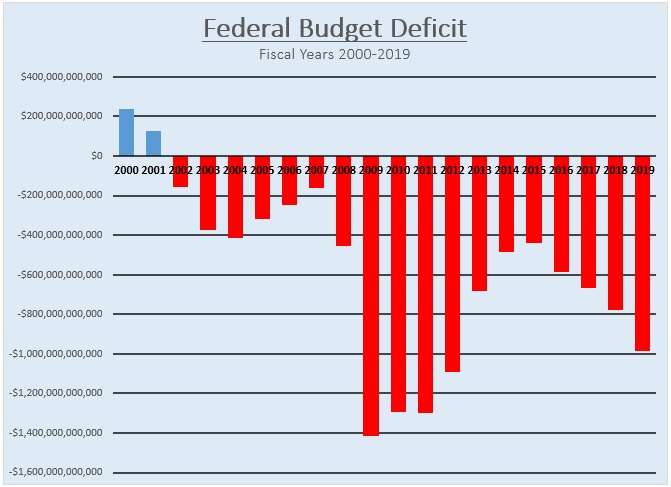Poll: Federal Budget Deficit Is a Bigger Problem Than Climate Change, Racism, and Terrorism
The problem, as always, is that voters are likely to say they want Congress to balance the budget, but are less likely to back any specific ideas for doing so.

The year 2020 will almost certainly mark a return to trillion-dollar federal deficits despite a full decade of consistent economic growth.
Most Americans are well aware that's a worrying combination. Unfortunately, that message hasn't reached policymakers in Washington, D.C., who seem happy to add ever larger sums to the bill future taxpayers will have to pay.
A Pew Research Center poll conducted earlier this month found that 53 percent of Americans view the federal budget deficit as a "very big" problem facing the country. That's a larger share of the public than the portion that views terrorism (39 percent), racism (43 percent), or climate change (48 percent) as a major problem.
Indeed, the only topics that score higher in the Pew poll are drug addiction and the affordability of health care and college educations. But while you'll hear lots of discussion about those three issues in next year's presidential campaigns, candidates will likely give considerably less attention to the deficit, even as it soars past the trillion-dollar threshold. That's because reducing the deficit requires a serious and difficult discussion about how the federal government can and should allocate its finite resources. It's much easier to promise student loan forgiveness and/or massive new health care entitlement spending.
Other recent polls show similar levels of concern about the deficit and the $23 trillion national debt. A YouGov/The Economist survey published in July found that 83 percent of Americans said the budget deficit was an important issue. A Gallop poll in March found that 95 percent of Americans worry at least a little about the national debt, including 50 percent who say they worry "a great deal" about it.
This year's Fiscal Confidence Index—which is published by the Peter G. Peterson Foundation and tracks Americans' confidence in the country's fiscal stability—found that 76 percent of voters want Congress to work on reducing the deficit, including 72 percent of Democrats and 84 percent of Republicans.
The problem, as always, is that voters are likely to say they want Congress to balance the budget, but are less likely to back any specific ideas for doing so—which at this point would require massive tax increases or huge spending cuts, and probably a combination of both.
Republicans spent the first half of this decade burnishing their credentials as deficit hawks. For a while, that worked—at least until Donald Trump was elected president.

Since 2016, the GOP has abandoned any pretense of caring about the deficit. Trump has concluded that he'll be gone before things get really bad, and the media talking heads who drove much of the "screw you, cut spending" mentality during the Obama years have given up, too.
And let's be clear, it is mostly a spending problem. In the fiscal year that ended on September 30 of this year, federal tax revenues increased by 4 percent but the deficit exploded because spending increased by more than 8 percent. That's simply unsustainable.
Meanwhile, most of the Democrats running for president are promising to make the deficit worse by expanding entitlements and spending vast sums of money. One of the few exceptions to that rule is Pete Buttigieg, the mayor of South Bend, Indiana, who might be new enough to national politics to actually have some awareness of mathematics or economics.
https://twitter.com/lizcgoodwin/status/1202642363287511041
That's a message Buttigieg is starting to deliver with regularity. He was the only candidate to talk about the deficit at last week's primary debate, and he recently told The Washington Post's editorial board that "we need to recognize that we're approaching a point where you can't ignore spending we need to do on infrastructure and safety net and health and education being crowded by debt service."
Buttigieg has been attacked by the Democratic Party's left wing for merely suggesting that the deficit might be something worth talking about. But if the polls are to be believed, he might be onto something.
It's probably foolish to hope that a discussion about the national debt will break through the culture wars, impeachment battles, and whatever Twitter fights Trump starts in 2020. But voters are signaling that they don't like the current status of rising, seemingly unsolvable budget deficits. Even if voters weren't concerned, the issue is too important to ignore.


Show Comments (154)